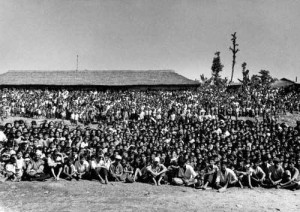Nepal-Bhutan talk on the card
For the first time in two years the democratically elected government of Bhutan is opening its mouth on the refugee issue, for long labeled as the issue of the “people in the camps in Nepal”. There has been sequence of heavy pressures on the new government from various sides.
The pressure started with the start of resettlement of ‘people from camps’ to different first world countries and visit to Bhutan by the Senator John McCain’s delegation, last year. The high level US delegation had given an assignment to the then recently elected government in Bhutan. The assignment included three major and six minor deeds Bhutan was expected to carry out within a given time frame. They were preparation for the repatriation of the people in camp who are willing to return to Bhutan, establishment of the US Embassy in Bhutan, transparency in the use of grants from the donors, improvement in the diplomatic relation with Nepal to solve the refugee crisis bilaterally, guarantee of freedom and security of the people in the opposition, change in the law to accommodate all section of the population, no more eviction on whatever reasons, etc.
Last month Foreign Minister Ugyen Tshering traveled to Washington to hand over the assignment which carried the bulk but a little content. The long report had one thing half positive. That was willingness of Bhutan to open an educational and cultural consulate in Thimphu instead of a full fledged US embassy. The shy FM met with Senator John Mc Cain and requested him to forward the assignment to White House. It was refused. The ultimatum must have been renewed or extended, or even warning must have been issued, Ugyen delegation returned with heat strong enough to make the leaders go rest less.
They sought help of south block in Delhi, India, to crack new ideas to fool US and prolong the tact. Indian Home Minister P. Chidambaram had to rush to assist Bhutan’s ministers in the new chase move. On his way to Bhutan he used the transit time in Tribhuwan International Airport in Kathmandu by calling an emergency meeting with Nepal’s Home Minister Bhim Rawal and cautioning him to prepare for an immediate bilateral talk with Bhutan on the issue of the exiled Bhutanese. This unusual meeting of two home ministers during the usual transit of Druk Air in TIA was sufficient indicator of heat in the rulers.
Not a coincidence Prime Minister Jigme Y Thinley rushed to Japan to meet Sadako Ogata, one of the former heads of UNHCR. During her leadership in the refugee organization, Jigme Thinly as a minister under the former Monarch Jigme Singye Wangchuck had developed a warm rapport with her. She was even invited to Bhutan to strengthen the intimacy. Now she is one of the most powerful figures who can be a right third person to suggest and influence on the issue of exiled Bhutanese and possible say to the pressurizing parties what Bhutan rulers want to say.
It is noteworthy to recall that immediately after her visit to Bhutan; she visited the refugees in camps in Nepal and assured them that she would see all the refugees back in Bhutan during her tenure.
What next? Now, out of many strategic moves designed, one would be to call for a positive dialogue with Nepal on the issue of exiled Bhutanese. The government in Nepal is right for the Bhutan to deal with, as Nepalese Prime Mnister Madhav Kumar Nepal is as good a friend of Bhutan’s rulers as Sher Bahadur Deuba who had agreed for Bhutan’s proposal to categorize exiled Bhutanese into four groups.
If anything is possible, bendable, melt-able and strike-able, it is now. So let’s expect Bhutan and Nepal will sit for a new round of talk and give pretext to the world to say that the work is going on for repatriation of the citizens expelled two decades back. However, for the exiled Bhutanese, there is not much to get excited right now.

